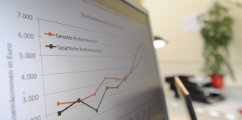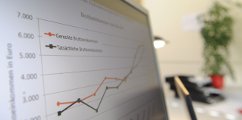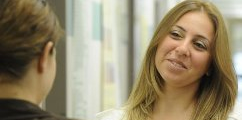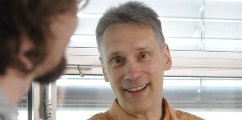Back to program – 1st day of the conference
2nd day of Conference: Academic Conference
Friday, September 21st, 2012
Bielefeld, Ravensberger Spinnerei, Großer Saal
Stream A – From Heterogeneities to Inequalities in the Life Course of Individuals
The six projects of Project Area A of the collaboratice research centre are dedicated to the genesis and the effects of inequality-relevant features of heterogeneity in the individual lifecourse under different contextual conditions. Four classes of heterogeneity features (ascriptive features, cultural differentiations, skills as well as activities) will be discussed and analyzed by their interaction. First, these features are essential because they determine individual lifecourse decisions, as they are personal resources influencing the development of preferences. Second, they are features which are perceived and judged on by collective actors, thus becoming criteria for being selected and be treated inequally in the context of networks and organizations. And third, they play a role for the development of preferences and for judging on perceived inequalities, most of all in the form of attitudes to justice.
Theoretically and methodically researching the development and effects of these individual features as a contextual enlargement of a purely individual lifecourse research is considered an important methodological future task of an explanantion-oriented research in the social sciences. Here, independently measured contextual development conditions are identified in families of origin, social networks, day nurseries, schools and housing environments, even in the variance of institutions of the nation state in the context of international comparisons. By integrating lifecourse and individual development, concerning the genesis of social inequalities it will become possible to distinguish psychic mechanisms from the path dependency of institutionalized lifecourses and to analyze their interaction. Furthermore, there is the attempt to make such a lifecourse- and individual development-integrating research internationally comparable, by reaching back to one´s own longitudinal data surveys as well as by help of the SOEP´s own secondary analyses and other data sources.
Abstracts Stream A
Project A1 – Project A2 – Project A3 –
Project A4 – Project A5 – Project A6
Stream B – From Heterogeneities to Inequalities in the Context of Organizations
The five projects of Project Area B of CRC 882 deal with organizations in the fields of education and work as actors and contexts of producing insecurity. The common basic idea is that organizations contribute essentially to the production of social inequalities because they perceive and interpret individual heterogeneities very differently and selectively, making them criteria for membership and the distribution of resources. In this context, three problems are particularly visible:
(1) As organizations channel interactions by way of formal position structures and systems of rules, they contribute to establishing boundaries and differentiate the distribution of rewards and strains. This way they not only transform individual heterogeneities into classified differences, they also open up selective realization opportunities along differentiaton criteria which are intra-organizationally judged on. The identification of such processes and mechanisms allows for more detailed assertions on how exactly organizations are important for generating inequalities.
(2) With organizations themselves becoming subject to horizontal differentiation and granting different advantages to their members, for an individual´s opportunities of access and realization it becomes ever more important into which organization he/she is included at what stage of his/her lifecourse and at which stage of its own development this organisation is. Then, inequalities – e. g. in the sense of cumulating advantages and disadvantages – are also a result of the sequence of individual memberships with the same or different organizations, which must be appropriately taken into account by inequality research.
(3) Both educational and work organizations are institutionalized action contexts where attributions are communicated and perpetuated. By the example of ethnically coded attributions, gender stereotypes and normative attitudes towards distributional justice it will be analyzed in detail how such a reproduction of attribution and interpretation patterns happens within organizations and which mechanisms work there.
Abstracts Stream B
Project B1 – Project B2 – Project B3 –
Project B4 – Project B5
Stream C – From Heterogeneities to Inequalities beyond the Nation State
The four projects of Project Area C of CRC 882 view at heterogeneity features, their combinations as well as thus resulting inequalities beyond the nation state. The projects go beyond the scope of the view of previous research, which views most of all at income disparities in the international or global context, and discuss participation in a variety of fields: labour market, education, health, politics, development cooperation, social security and the social integration of migrants. In this context, the analysis of the interaction and intersection of transnationality as a heterogeneity feature plays an important role, together with other features such as gender, religion, legal status, nationality and ethnicity. Transnationality refers to transactions within networks, groups and organizations, resulting in continuous and dense cross- border processes. It indicates processes which may potentially happen at a variety of levels (scales). A process-oriented, mechanismic analysis of inequalities beyond the nation state can be applied both to migrants and non-migrants. A crucial question is that about comparison criteria. How do the perception and judgement on, but just as well the way of dealing with social inequalities shift, given that socially comparative groups are no longer restricted to the closed spaced of nationality? These questions as well as others resulting from them will be presented on the basis of running research projects dealing with a number of typical cases: the informal social security of mobile and immobile individuals, cross-border landscapes, the social construction of heterogeneity criteria in the fields of justice and politics, and finally semantics of global inequality in the context of international organisations.
Abstracts Stream C
Project C1 – Project C3 –
Project C4 – Project C5
Workshop INF-Projekt
Program:
9:00 a.m. Keynote Address
- „Modernity and the Discovery of (In)Equality”
- Prof. Dr. Göran Therborn (University of Cambridge)
10:00 a.m Workshops
-
Stream A - From Heterogeneities to Inequalities in the Life Course of Individuals
- Chair:
- Prof. Dr. Martin Diewald (SFB 882, Universität Bielefeld)
- Comments:
- Prof. Dr. Heike Solga (Wissenschaftszentrum Berlin)
- Prof. Dr. Karin Kurz (Georg-August-Universität Göttingen)
-
Stream B - From Heterogeneities to Inequalities in the Context of Organizations
- Chair:
- Prof. Dr. Stefan Liebig (SFB 882, Universität Bielefeld)
- Comments:
- Prof. Dr. Tanja van der Lippe (Universiteit Utrecht)
- Prof. Dr. Frank-Olaf Radtke (Goethe-Universität Frankfurt am Main)
-
Stream C - From Heterogeneities to Inequalities beyond the Nation State
- Chair:
- Prof. Dr. Thomas Faist (SFB 882, Universität Bielefeld)
- Comments:
- Prof. Dr. Wolfgang Schröer (Universität Hildesheim)
- Prof. Dr. Janusz Mucha (Akademia Górniczo-Hutnicza Kraków)
- Prof. Dr. Ludger Pries (Ruhr-Universität Bochum)
12:00 a.m Lunch Break
1:00 p.m. Continuation of Workshops A, B, C
Stream A: From Heterogeneities to Inequalities in the Life Course of Individuals
Stream B: From Heterogeneities to Inequalities in the Context of Organizations
Stream C: From Heterogeneities to Inequalities beyond the Nation State
1:00 p.m. Workshop INF-Projekt
- Chair:
- Dr. Johanna Vompras
- Comments:
- Arofan Gregory (Open Data Foundation, Tucson)
3:00 p.m. Final panel
- Host:
- Prof. Dr. Peter A. Berger (Universität Rostock)
- Participants:
- Prof. Dr. Donald Tomaskovic-Devey (University of Massachusetts Amherst)
- Prof. Dr. Monika Jungbauer-Gans (Universität Erlangen-Nürnberg)
- Dr. Magdalena Nowicka (Max-Planck-Institut zur Erforschung multireligiöser und multiethnischer Gesellschaften Göttingen)
4:00 p.m. End of the conference












